Do you dream of exploring the underwater world? Scuba diving is an exhilarating adventure that allows you to discover the wonders of the ocean’s depths. But before you take the plunge, it’s important to equip yourself with the essential knowledge and gear. In this section, we’ll dive deep into the scuba diving essentials, including must-have gear and tips for beginners, as well as provide information on scuba diving lessons and equipment.
Key Takeaways:
- Understand the essential gear and tips for scuba diving
- Get certified and properly equipped for safe diving
- Learn scuba diving etiquette to protect the underwater environment
- Capture underwater memories with scuba diving photography tips
- Combine adventure and relaxation with scuba diving holidays
Scuba Diving Certification: Your Gateway to the Underwater World
If you’re looking to dive deep into the world of scuba diving, obtaining a scuba diving certification is essential. Not only does it provide a wealth of knowledge and skills, but it also ensures that you can explore underwater environments confidently and safely.
The process of getting certified typically involves completing a series of scuba diving lessons. These lessons cover everything from basic knowledge of scuba diving equipment and techniques to more advanced skills like underwater navigation and buoyancy control.
When it comes to scuba diving equipment, the minimal gear requirements for certification include a mask, fins, snorkel, regulator, BCD (buoyancy control device), and dive computer. However, some dive centers may also require additional equipment such as a wetsuit or weight system.
The Benefits of Scuba Diving Certification
Let’s take a closer look at some of the benefits you’ll enjoy with a scuba diving certification:
- Ability to rent scuba diving equipment and tanks from dive centers
- Access to a wider range of dive sites, including deeper and more complex environments
- Increased safety and peace of mind through proper education and training
- The ability to dive with a buddy who is also certified, expanding your diving opportunities
- A sense of personal achievement and growth as you learn and develop new skills
By investing in a scuba diving certification, you’re opening up a world of possibilities and experiences that are otherwise inaccessible to non-certified divers. Not to mention, it’s an incredible way to connect with nature and witness the beauty of marine life up close.
Essential Scuba Diving Gear: A Comprehensive Guide
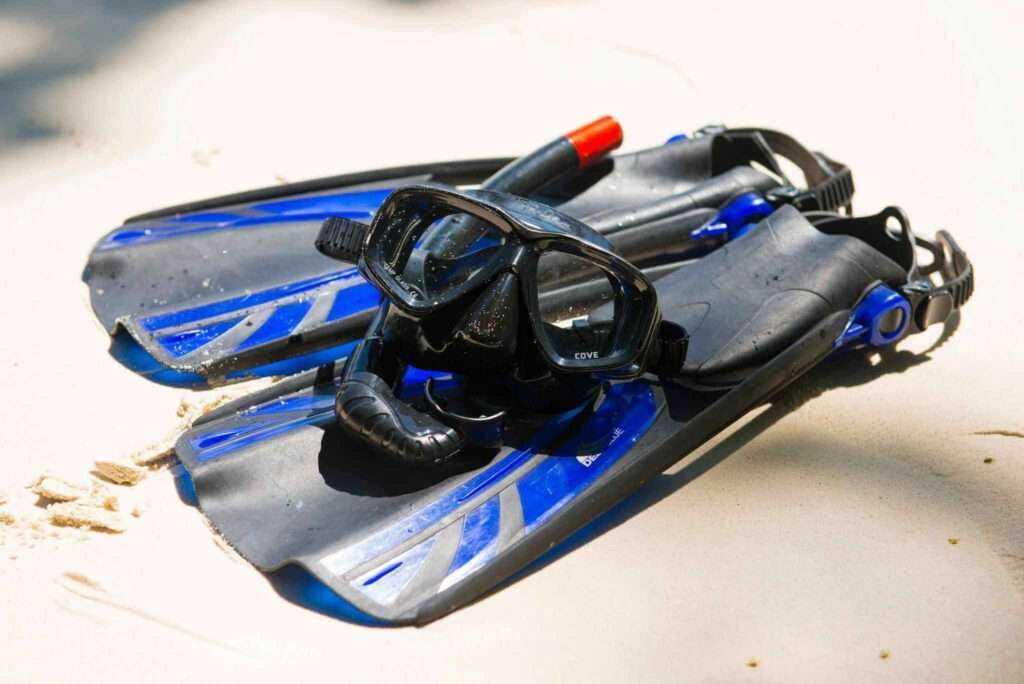
Scuba diving gear plays a critical role in your dive experience, ensuring your safety, comfort, and enjoyment. Whether you’re a beginner or an experienced diver, knowing the right gear to use is vital. In this section, we’ll cover the essential equipment you need to make the most of your dive.
Wetsuits and Drysuits
Wetsuits and drysuits serve as a barrier between the water and your body, providing insulation to keep you warm while you dive. Wetsuits are made of neoprene and are suitable for warm-water diving. Drysuits, on the other hand, are made of waterproof material and are ideal for cold-water diving. They’re available in different sizes, materials, and thicknesses, so it’s important to choose one that fits you well and meets your specific needs.
Masks and Fins
Masks and fins are essential for clear vision and efficient propulsion underwater. Masks come in various shapes and sizes, and it’s essential to choose one that seals tightly on your face and provides an unobstructed view. Fins help you move through the water efficiently, reducing effort and conserving energy. They’re also available in different styles and sizes, so choose fins that fit your feet comfortably and facilitate easy movement underwater.
| Essential Scuba Diving Gear | Description |
| Regulator | A device that regulates the air pressure from your tank and delivers air to your mouthpiece. It consists of a first-stage, second-stage, and alternate-second-stage octopus. |
| BCD (Buoyancy Control Device) | A device that helps you control your buoyancy underwater, enabling you to ascend and descend as needed. It also provides storage for other scuba gear and ensures your safety at the surface. |
| Dive Computer | A device that tracks your dive depth, time, and nitrogen levels, helping you avoid decompression sickness. It also provides information on your ascent rate and dive plan, ensuring your safety during the dive. |
Regulator, BCD, and Dive Computer
Regulators, BCDs, and dive computers are essential pieces of equipment that enable you to breathe safely, control your buoyancy, and track your dive. Regulators regulate the air pressure from your tank and deliver air to your mouthpiece. BCDs help you control your buoyancy underwater, enabling you to ascend and descend as needed. They also provide storage for other scuba gear and ensure your safety at the surface. Dive computers track your dive depth, time, and nitrogen levels, helping you avoid decompression sickness. They also provide information on your ascent rate and dive plan, ensuring your safety during the dive.
Considerations When Choosing Scuba Diving Gear
When choosing scuba diving gear, there are many factors to consider, including the type of diving you plan to do, water temperature, personal preferences, and budget. It’s essential to select gear that fits well, is comfortable, and meets your specific needs. Experienced instructors and dive shops can provide helpful guidance and recommendations.
Scuba Diving Safety: Tips for a Secure Dive
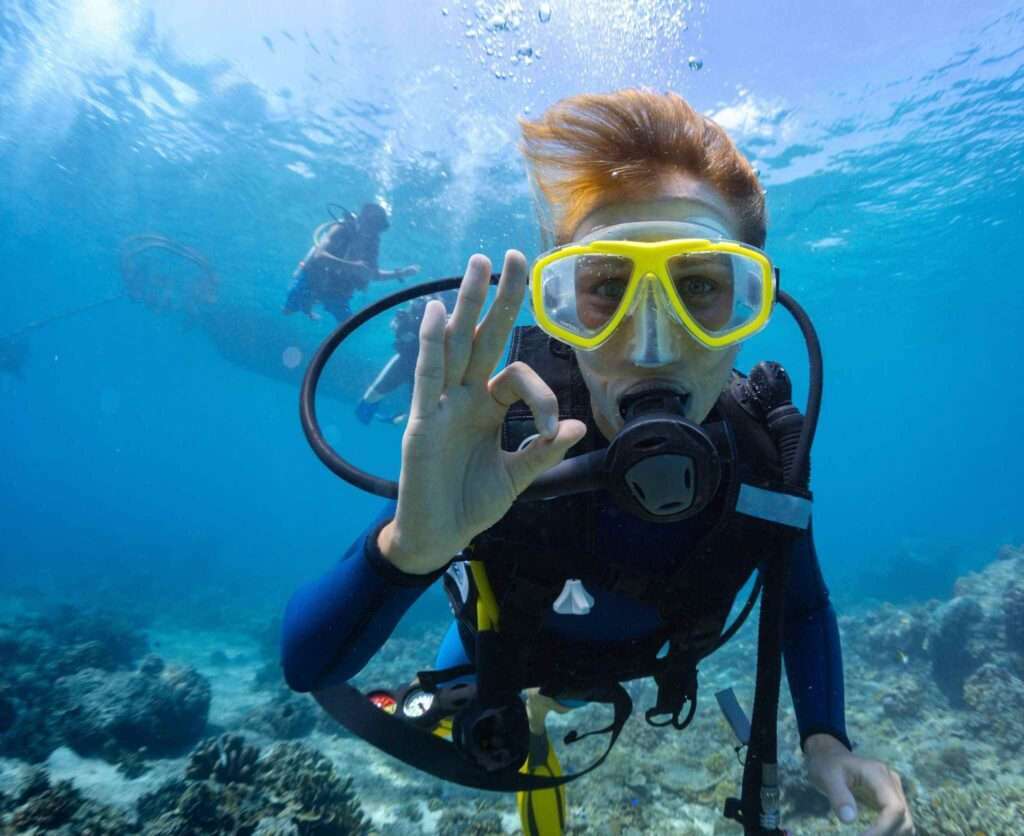
When it comes to scuba diving, safety should always come first. Here are some essential tips and guidelines to ensure you have a secure and enjoyable dive:
Proper Equipment Maintenance
Keeping your scuba diving equipment in top condition is critical to ensure safety during dives. Always inspect your equipment before use and have it regularly serviced by a certified technician.
Buddy System Practices
Never dive alone – always have a dive buddy with you. Ensure you and your buddy have a clear understanding of each other’s diving abilities, communication signals, and emergency procedures before starting your dive.
Emergency Procedures
Be prepared for unexpected situations and know the appropriate emergency procedures. Ensure you have a dive plan, emergency contact information, and a first aid kit on hand.
By following these safety tips and guidelines, you’ll be able to enjoy a secure and unforgettable scuba diving experience.
Scuba Diving Tips for Beginners: Start Your Underwater Adventure
If you’re new to scuba diving, it can be an intimidating experience. However, with the right guidance, you can easily master essential skills and feel confident underwater. Below are expert tips to help beginners enjoy their first scuba diving adventure:
1. Take a Scuba Diving Lesson
Before diving in, enroll in a scuba diving lesson with a certified instructor. You’ll learn the basics of scuba diving, including how to use equipment, different techniques, and safety measures.
2. Master Buoyancy Control
Buoyancy control is an essential skill that helps you conserve energy, reduce exhaustion, and avoid accidental damage to the underwater environment. Take time to train, find the right weighting, and practice until you feel comfortable.
3. Manage Air Consumption
Pay attention to your air consumption, and make sure you learn how to breathe properly and efficiently. Avoid hyperventilating, take deep breaths, and control your breathing pace to ensure you have enough air to last throughout the dive.
4. Get the Right Scuba Diving Equipment
Invest in quality scuba diving equipment that fits well and complements your diving skills. Ensure you have a mask that fits snuggly, fins that work well with your kicking style, and a wetsuit that matches the water temperature.
5. Buddy Up
Scuba diving with a buddy is mandatory for safety reasons. Partner up with a fellow diver and maintain close communication, so you can always keep an eye on each other and be prepared to assist in case of an emergency.
By following these tips and investing time in training, you’ll be able to enjoy your scuba diving adventures and explore the underwater world with confidence.
Top Scuba Diving Destinations: Explore the Depths
If you’re looking for the ultimate scuba diving experience, consider visiting one of the world’s top scuba diving destinations. These locations offer breathtaking underwater sights, from vibrant marine life to stunning coral reefs. Here are some of the best scuba diving destinations to add to your travel bucket list.
| Destination | Features |
| The Great Barrier Reef, Australia | One of the world’s largest coral reef systems, home to an abundance of marine life. |
| Bali, Indonesia | Rich in biodiversity with many species not found anywhere else in the world. |
| The Red Sea, Egypt | Clear waters and ancient shipwrecks to explore, with diverse marine life. |
| The Maldives | Crystal-clear waters, breathtaking coral reefs, and abundant tropical marine life. |
| The Galapagos Islands, Ecuador | Rich in unique marine life, with opportunities to swim with playful sea lions and penguins. |
But choosing the right destination is just the beginning. To fully experience each location, consider taking a scuba diving tour. These tours provide expert guidance on local marine life and offer access to the most breathtaking dive spots, ensuring an unforgettable underwater adventure. Book your scuba diving tour today and discover the magic of these incredible scuba diving destinations.
Scuba Diving Gear Maintenance: Ensure Longevity and Performance
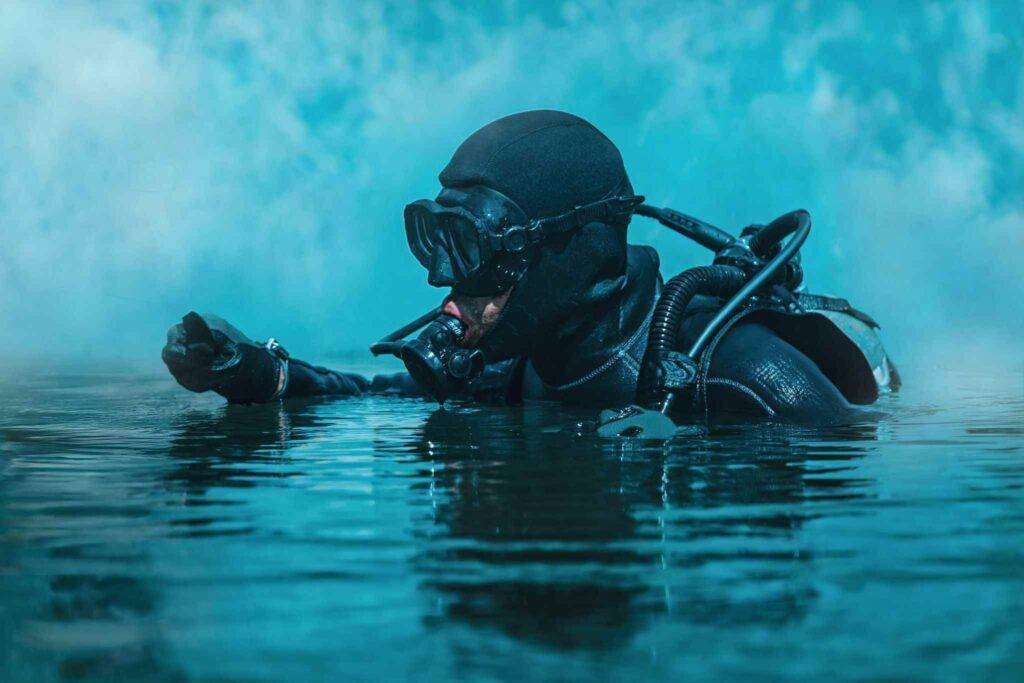
Proper maintenance of your scuba diving gear is crucial for its longevity and optimal performance. Taking care of your equipment not only ensures you get the most out of it but also helps prevent equipment-related accidents. Follow these step-by-step instructions to clean, store, and maintain your scuba diving gear to ensure it remains in excellent condition for future dives.
Cleaning Your Scuba Diving Gear
Cleaning your gear after every dive helps extend its lifespan. Use freshwater to rinse off saltwater, sand, and other debris from the gear, and avoid using harsh chemicals as they can damage the equipment. For wetsuits, soak them in a mild cleaning solution specific for neoprene, rinse them thoroughly, and hang them to dry in a shaded area. For masks and regulators, disassemble them and clean them gently with warm soapy water, then rinse and air-dry them.
Storing Your Scuba Diving Gear
Storing your gear properly is as important as cleaning it. Make sure it’s completely dry before storing it, and avoid exposing it to direct sunlight or extreme temperatures that can cause damage and deterioration. Store your gear on hangers or racks to keep them off the ground and prevent them from being squeezed or bending. For wetsuits, avoid folding them, as it can cause creases that may damage the neoprene.
Maintaining Your Scuba Diving Gear
Maintaining your gear involves checking for wear and tear, replacing worn-out parts, and ensuring all areas of the equipment are functioning optimally. Inspect your gear regularly, looking out for damage to seams, zippers, and buckles, and replace any damaged parts before your next dive. For regulators, have them serviced annually to ensure their performance.
| Equipment | Maintenance Tips |
| Wetsuits | Rinse thoroughly after each dive, use a mild cleaning solution, and hang to dry away from sunlight. Avoid folding to prevent creases. |
| Masks | Disassemble, clean with warm soapy water, rinse, and air dry. Store in a protective case to prevent scratches. |
| Regulators | Have them serviced annually to ensure optimal performance. Rinse in freshwater after each dive, and store in a safe place where they won’t be dropped or bumped. |
| Dive Computers | Follow the manufacturer’s instructions for cleaning and maintenance. Replace batteries regularly, and store in a protective case when not in use. |
| BCDs | Rinse and hang to dry after each dive, avoiding direct sunlight. Check for leaks regularly, and repair or replace parts as needed. |
By taking care of your scuba diving gear, you’ll ensure its longevity and optimal performance for your future dives. So keep your gear clean, store it properly, and maintain it regularly to get the most out of your underwater adventures.
Scuba Diving Etiquette: Respect the Underwater Environment
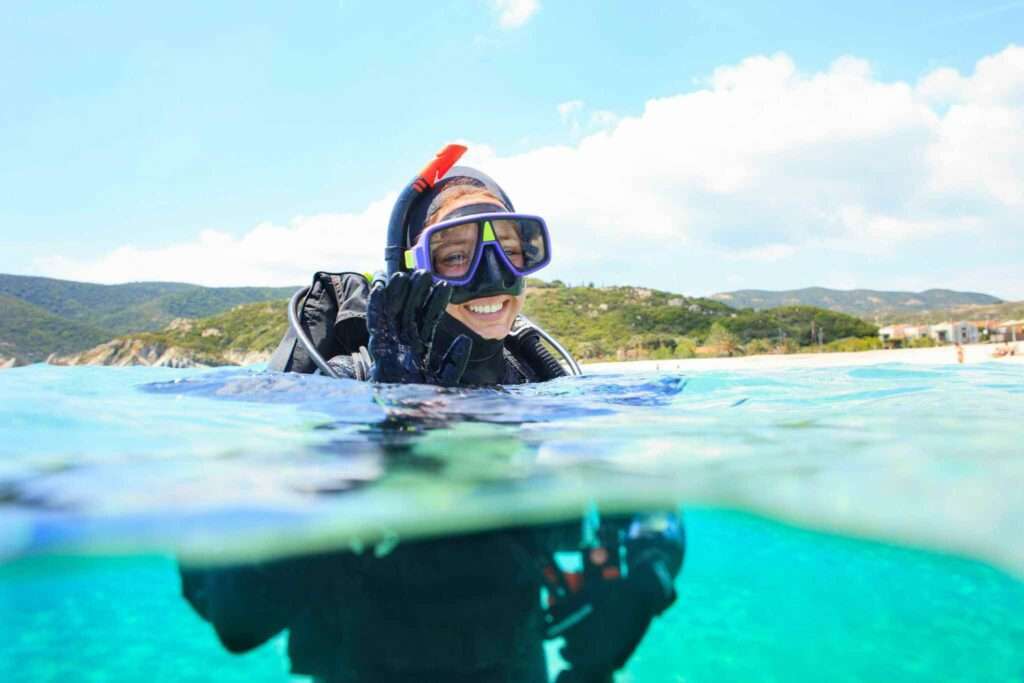
Scuba diving allows us to explore a fascinating underwater world full of color and life. As responsible divers, it’s essential to follow proper scuba diving etiquette to protect the environment and ensure that this natural beauty remains intact for future generations.
Here are some tips to help you be a responsible diver:
- Respect marine life: Always maintain a safe distance from marine creatures, and avoid touching or disturbing them. Remember that we are visitors in their home, and we should respect their space.
- Reduce your impact: Avoid stirring up the seabed when swimming, as this can damage fragile ecosystems. Also, avoid removing any coral or other marine life, no matter how pretty they may seem.
- Practice good diving practices: Ensure that your equipment is well-maintained and functioning correctly before diving. Also, follow good buddy system practices to ensure you have someone to rely on if anything goes wrong.
Scuba Diving Photography Tips: Capture Underwater Moments
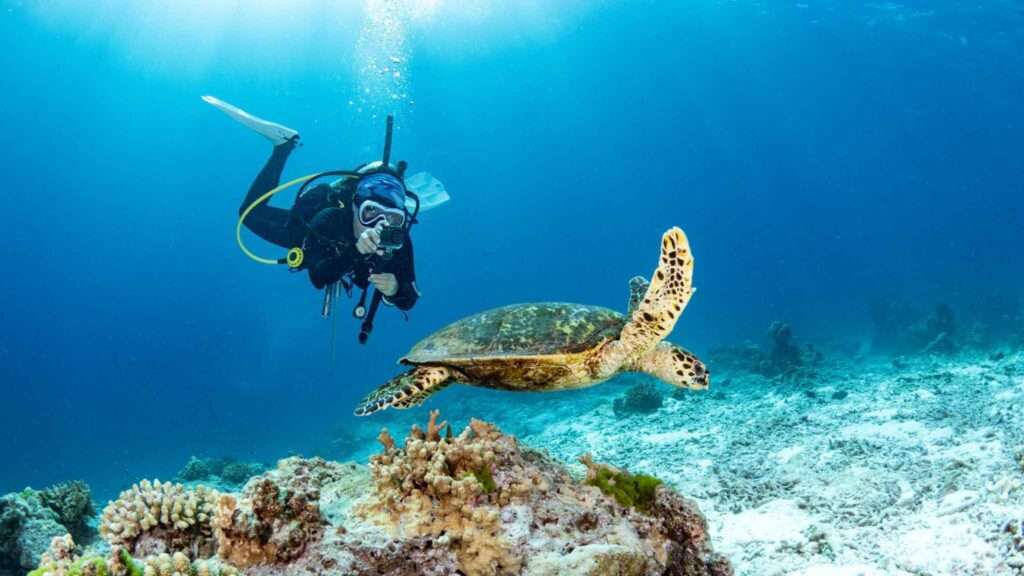
Scuba diving offers a unique opportunity to witness the world beneath the waves. To capture these incredible moments and share them with your friends and family, it’s essential to have the right equipment and knowledge. Follow these scuba diving photography tips to take stunning underwater photographs:
1. Choose the Right Camera Gear
Invest in a high-quality underwater camera that’s designed for scuba diving. Look for cameras that are waterproof, pressure-resistant, and can handle low light conditions. A good choice is the Sealife DC2000, which offers advanced features such as full manual control and RAW format.
2. Master Composition Techniques
Take some time to master composition techniques that will make your photographs more visually appealing. Apply the rule of thirds by placing your subject off-center and using the surrounding environment to create depth and contrast.
3. Learn about Lighting Conditions
Underwater lighting conditions can be challenging, so it’s essential to understand how to work with natural light to enhance your photographs. Use the sun’s rays to your advantage to create stunning silhouettes or highlight a subject’s natural colors.
4. Experiment with Filters
Filters can help to balance out color tones and improve the clarity of your underwater photographs. Consider investing in filters such as UV, red, or polarizing to create dynamic and vivid photos.
5. Practice, Practice, Practice
As with any skill, practice makes perfect. Take the time to experiment with different techniques, try out new gear, and practice consistently to improve your scuba diving photography skills.
| Scuba Diving Photography Tips | |
| Choose the Right Camera Gear | Invest in a high-quality underwater camera that’s designed for scuba diving. |
| Master Composition Techniques | Apply the rule of thirds by placing your subject off-center and using the surrounding environment to create depth and contrast. |
| Learn about Lighting Conditions | Use the sun’s rays to your advantage to create stunning silhouettes or highlight a subject’s natural colors. |
| Experiment with Filters | Invest in filters such as UV, red, or polarizing to create dynamic and vivid photos. |
| Practice, Practice, Practice | Take the time to experiment with different techniques, try out new gear, and practice consistently to improve your scuba diving photography skills. |
Scuba Diving Holidays: Combine Adventure and Relaxation
If you’re looking for a perfect combination of adventure and relaxation, scuba diving holidays are the way to go. Imagine exploring stunning reefs and marine life during the day, and then winding down with refreshing drinks and amazing views. We’ve selected top destinations and resorts that offer exceptional scuba diving experiences along with opportunities for rest and rejuvenation.
Top Scuba Diving Destinations for Holidays
| Destination | What to Expect |
| Bali, Indonesia | Experience magnificent biodiversity through drift dives and wreck dives. Afterward, unwind amidst the lush greenery and exotic culture of Bali. |
| Cairns, Australia | Explore the Great Barrier Reef, one of Australia’s natural wonders, and discover its breathtaking beauty. Take a break and enjoy Cairns’ charming waterfront and local cuisine. |
| Roatán, Honduras | Uncover the world-class coral reefs and marine life of Roatán, and top it off with a relaxing stay in a luxurious beach resort. |
Each of these destinations offers a unique and unforgettable diving experience, combined with unparalleled relaxation after a day spent exploring the underwater world.
Essential Scuba Diving Gear for Holidays
When packing for a scuba diving holiday, it’s important to bring the essential gear to ensure a safe and enjoyable dive. Some essential gear you may need includes:
- Wetsuit and fins
- Regulator and dive computer
- Mask and snorkel
- Buoyancy control device (BCD)
Remember to check with your dive center or resort for specific gear requirements or recommendations for the destination you’ll be visiting.
With the right gear, scuba diving holidays can be an unforgettable adventure. So pack up your gear, and get ready to experience a scuba diving adventure combined with the ultimate relaxation.
Conclusion
Scuba diving is a thrilling activity that offers a unique opportunity to explore the underwater world. By understanding the essential gear, safety measures, and top destinations, you can embark on unforgettable underwater adventures. Remember to prioritize safety and respect the environment, and continue learning and exploring this fascinating realm.
We hope this guide has provided you with valuable insights and expert tips to enhance your scuba diving experiences. Whether you’re a beginner or an experienced diver, there’s always room to learn and grow in this exciting field.
So, pack your scuba diving gear and get ready to dive into a world of wonder. Happy diving!
FAQ
What gear do I need for scuba diving?
The essential gear for scuba diving includes a mask, snorkel, fins, wetsuit or drysuit, buoyancy compensator device (BCD), regulator, dive computer, and weights. Additionally, you may need a dive light, compass, and dive knife depending on your dive conditions and preferences.
How long does it take to get scuba diving certification?
The duration of scuba diving certification courses can vary, but it typically takes around 3-5 days to complete the open water certification course. This includes theory sessions, pool or confined water training, and open water dives. However, the timeline may differ based on individual learning pace and availability.
Can I scuba dive without certification?
It is strongly recommended to obtain a scuba diving certification before engaging in dives. Certification ensures you have received proper training on dive techniques, safety procedures, and equipment usage. Diving without certification can be dangerous and may limit your access to certain dive sites.
How often should I service my scuba diving equipment?
Regular equipment servicing is essential to maintain the performance and safety of your scuba diving gear. It is recommended to have your equipment serviced annually or as recommended by the manufacturer. Additionally, perform routine inspections and cleaning after each dive to detect any signs of damage or wear.
What are some top scuba diving destinations?
There are numerous incredible scuba diving destinations worldwide. Some popular ones include the Great Barrier Reef in Australia, the Maldives, the Red Sea in Egypt, Fiji, the Galapagos Islands, and Cozumel in Mexico. Each destination offers unique underwater experiences and diverse marine life.
How can I improve my scuba diving skills?
Improving your scuba diving skills requires practice and experience. Consider taking advanced courses, such as underwater navigation or deep diving, to enhance your abilities. Regularly diving in different environments and conditions can also expand your skill set. Remember to always dive within your comfort level and seek guidance from experienced divers or instructors.
What are some scuba diving safety tips?
To ensure a safe scuba diving experience, always check your equipment before diving, dive with a buddy, maintain proper buoyancy control, ascend slowly, and follow decompression guidelines. It is also crucial to stay hydrated, be aware of your surroundings, and adjust your dive plans based on weather and dive site conditions.
Can I go scuba diving if I can’t swim?
Basic swimming skills are typically required to participate in scuba diving. While you don’t need to be an Olympic-level swimmer, you should feel comfortable in the water and be able to maintain yourself on the surface. However, some dive centers may offer programs that cater to non-swimmers or individuals with limited swimming abilities, allowing them to experience scuba diving under close supervision.
Do I need to buy all scuba diving gear?
While owning your scuba diving gear offers comfort and familiarity, it is not necessary to purchase everything right away. Many dive centers provide rental equipment, especially for beginners. It is recommended to invest in your own mask, snorkel, and fins initially, as these are personal items that affect comfort and fit. Over time, you can gradually acquire additional gear based on your diving frequency and preferences.
Are there any age restrictions for scuba diving?
Age restrictions for scuba diving vary depending on the certification agency and diving program. Some agencies offer junior certifications for children as young as 10 years old, while others require participants to be at least 12 or 15 years old. It is important to check with the dive center or certification agency to determine the minimum age requirements for specific courses.
